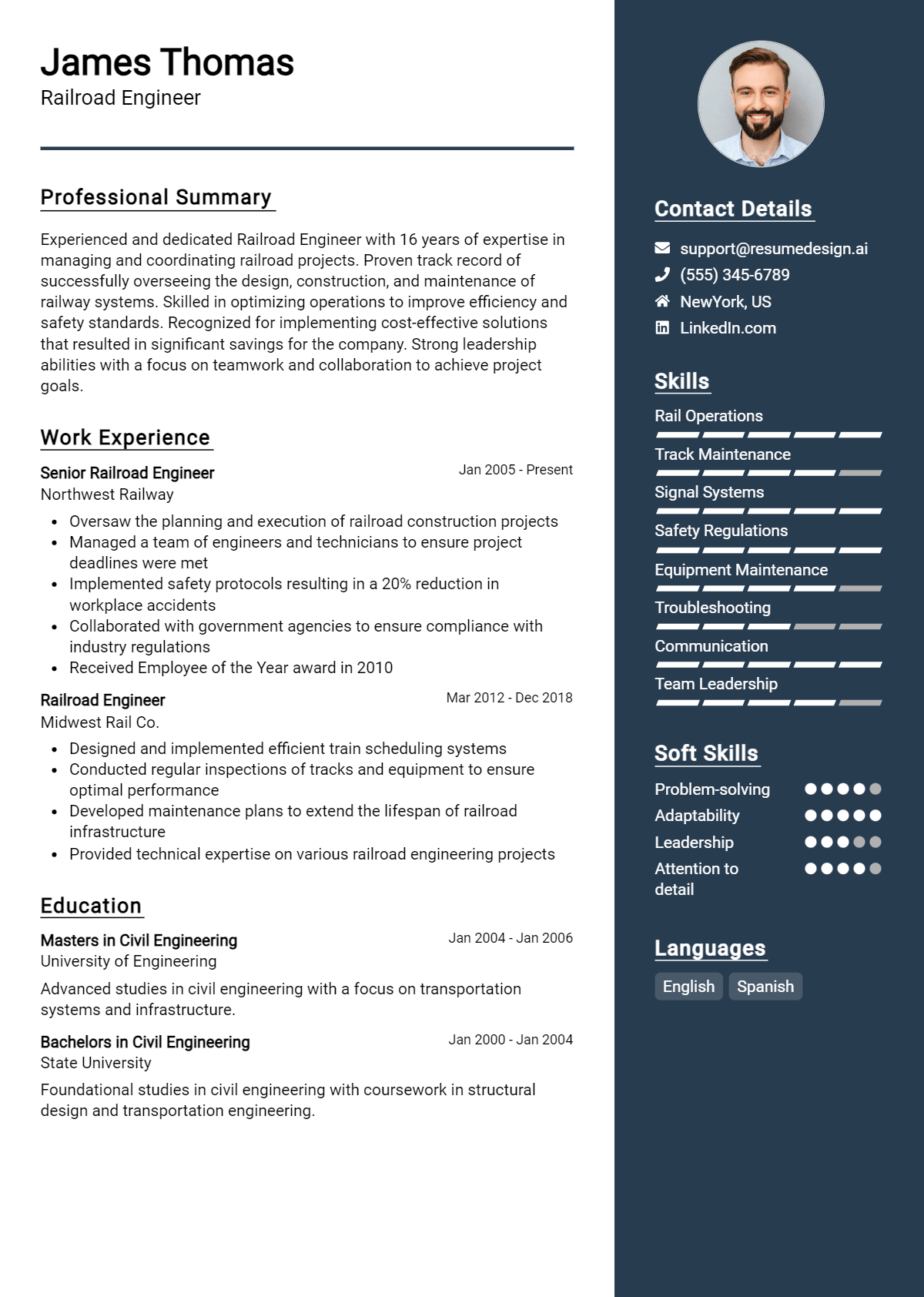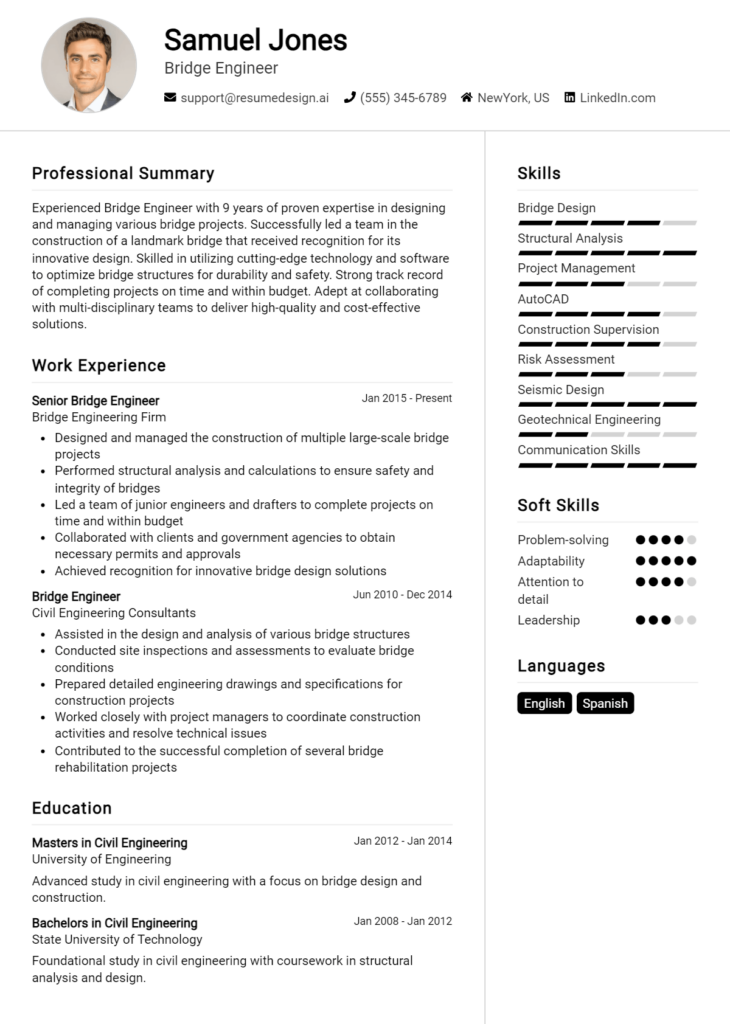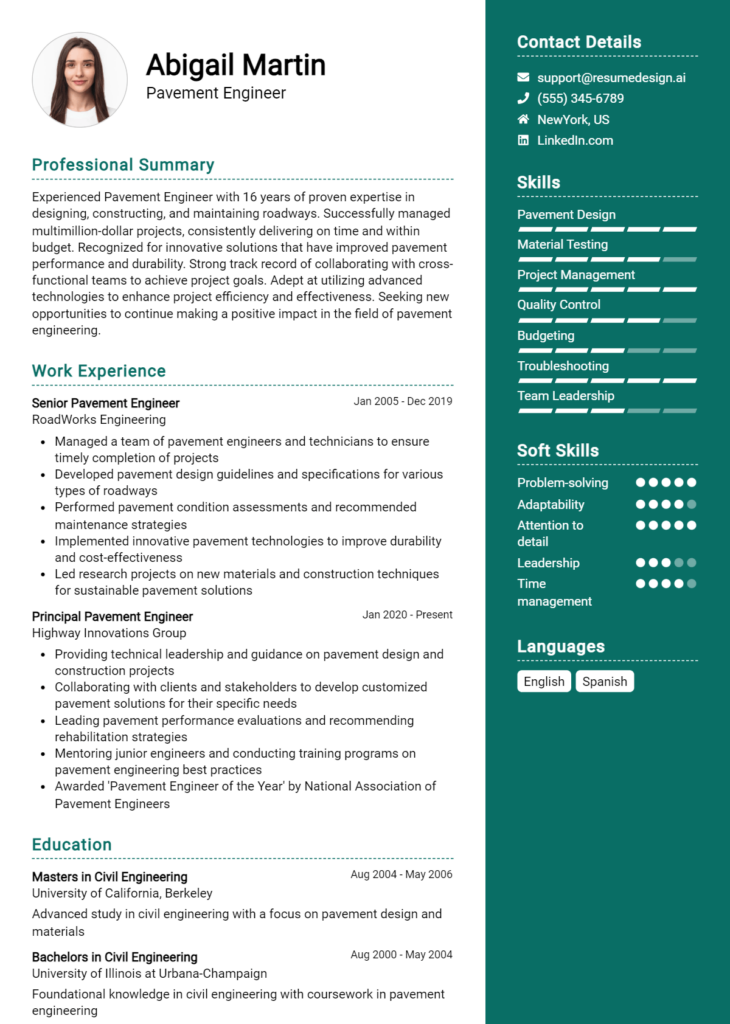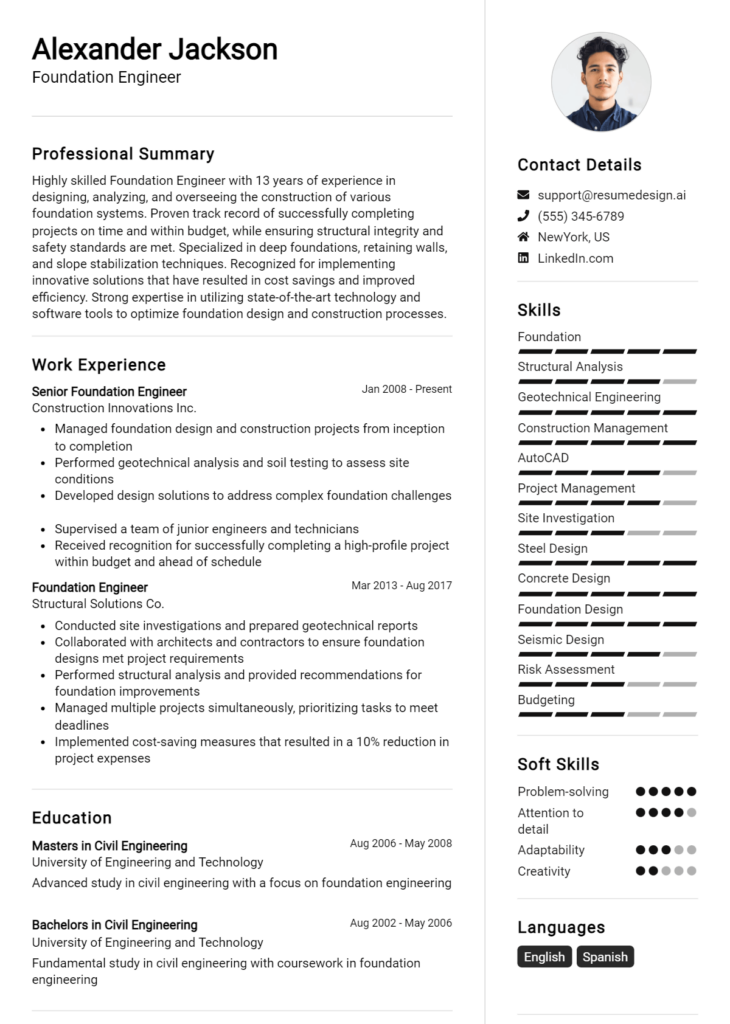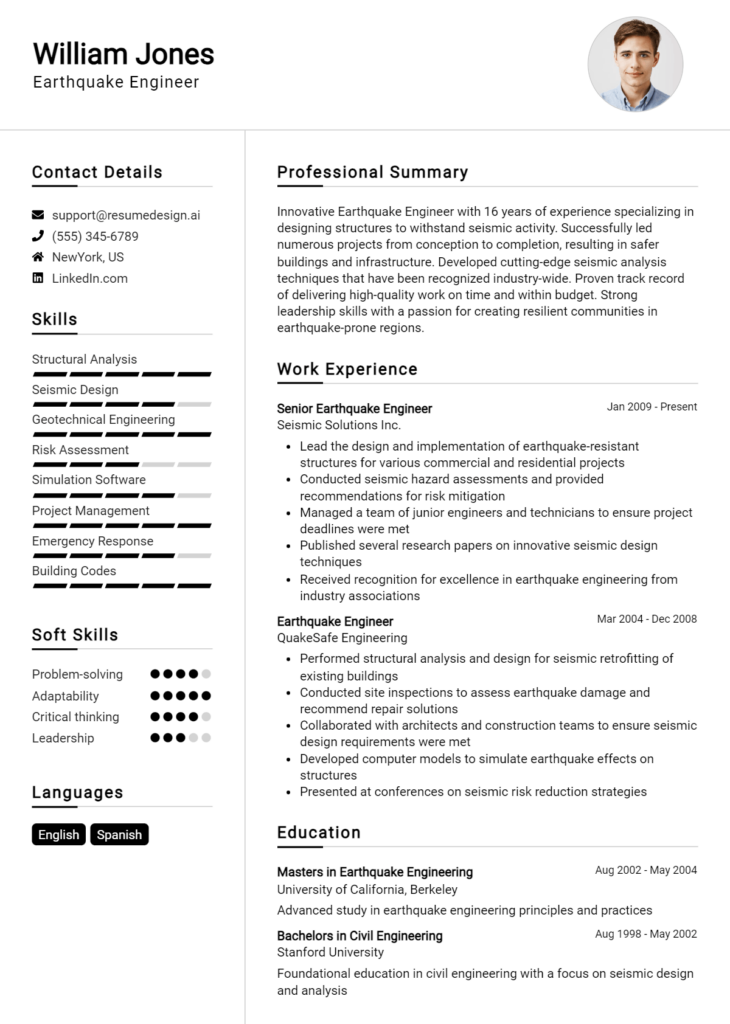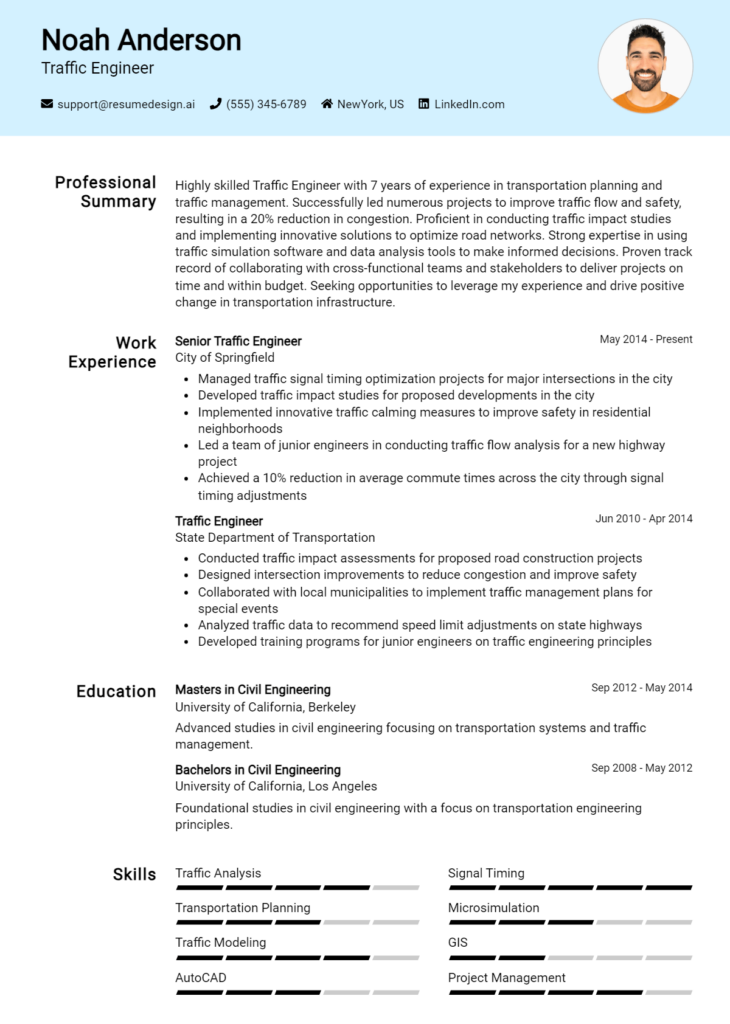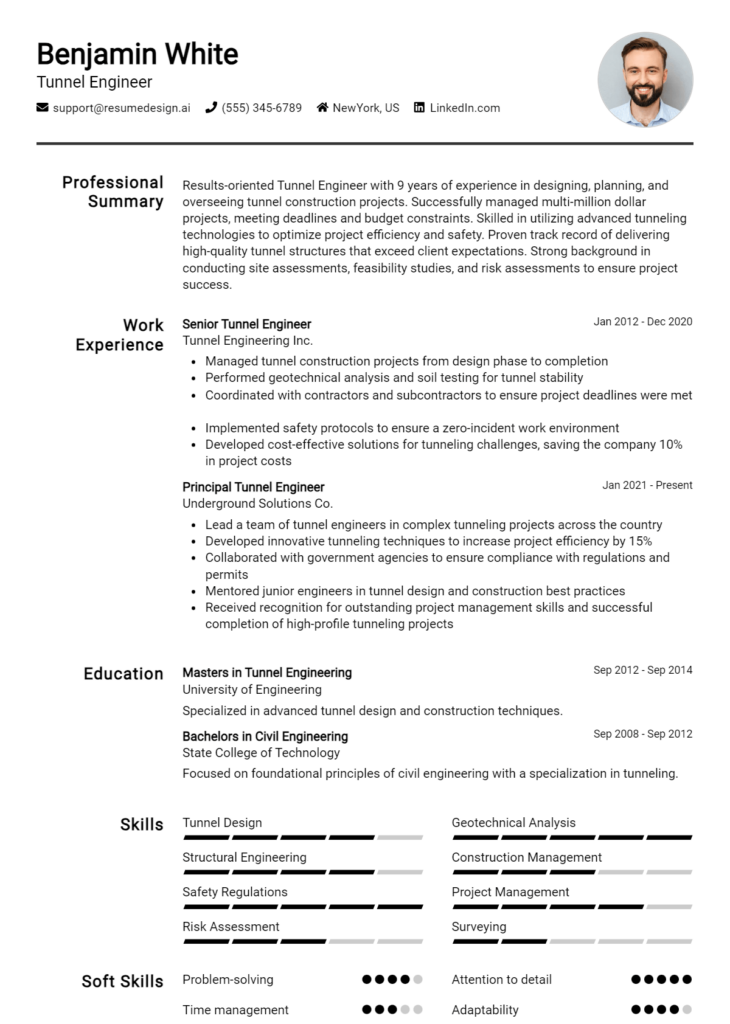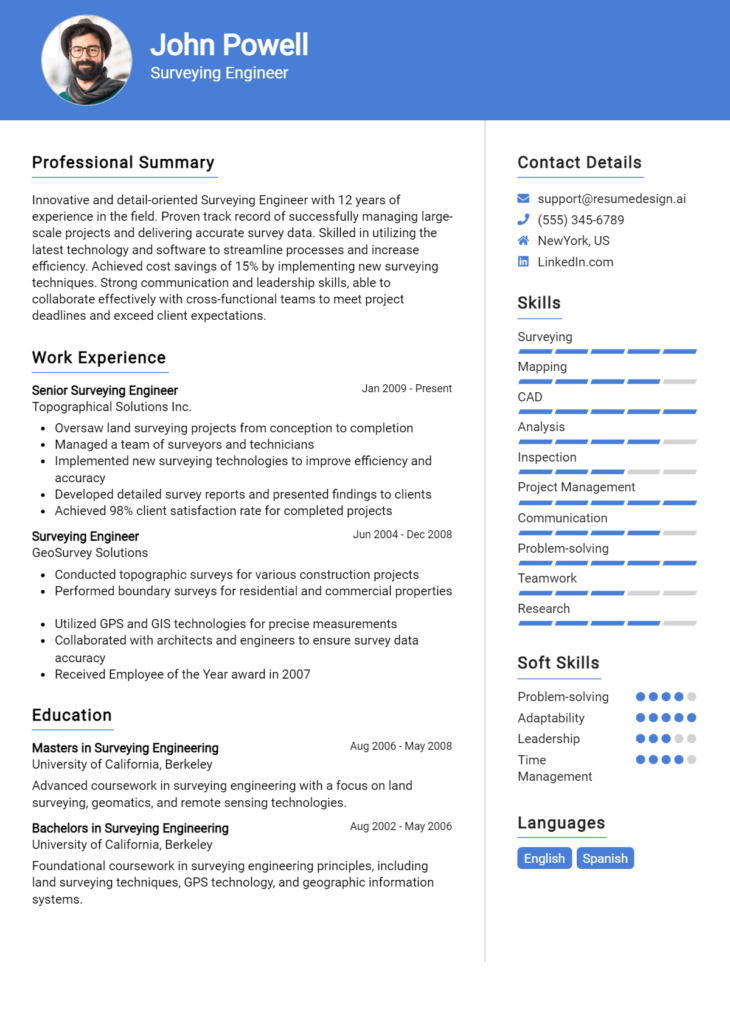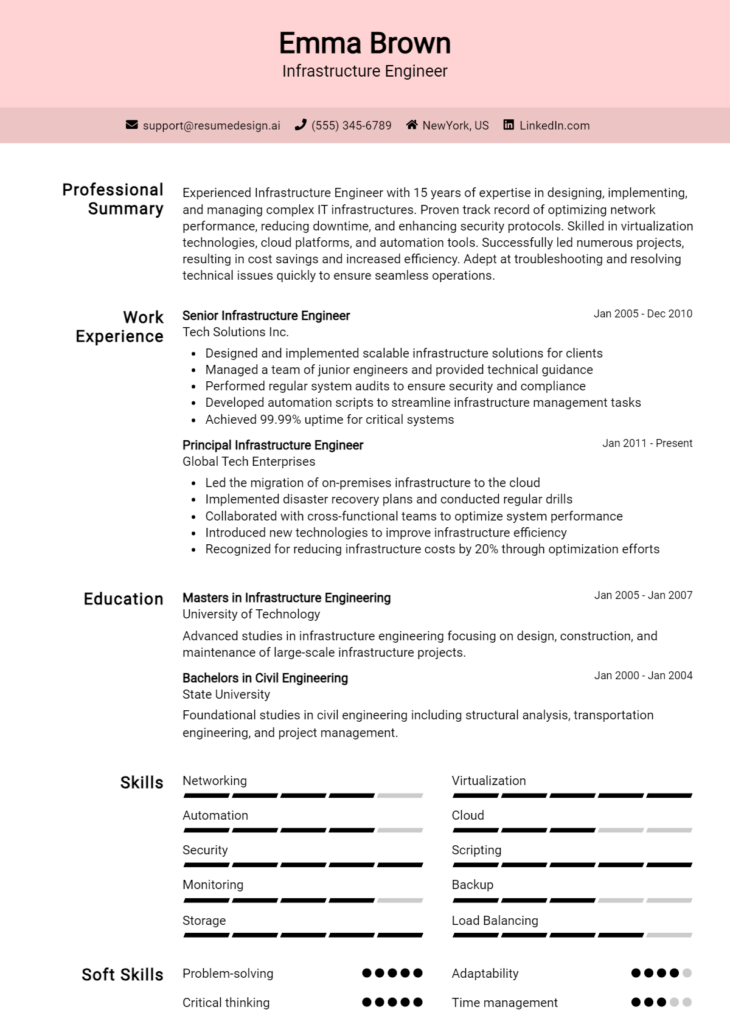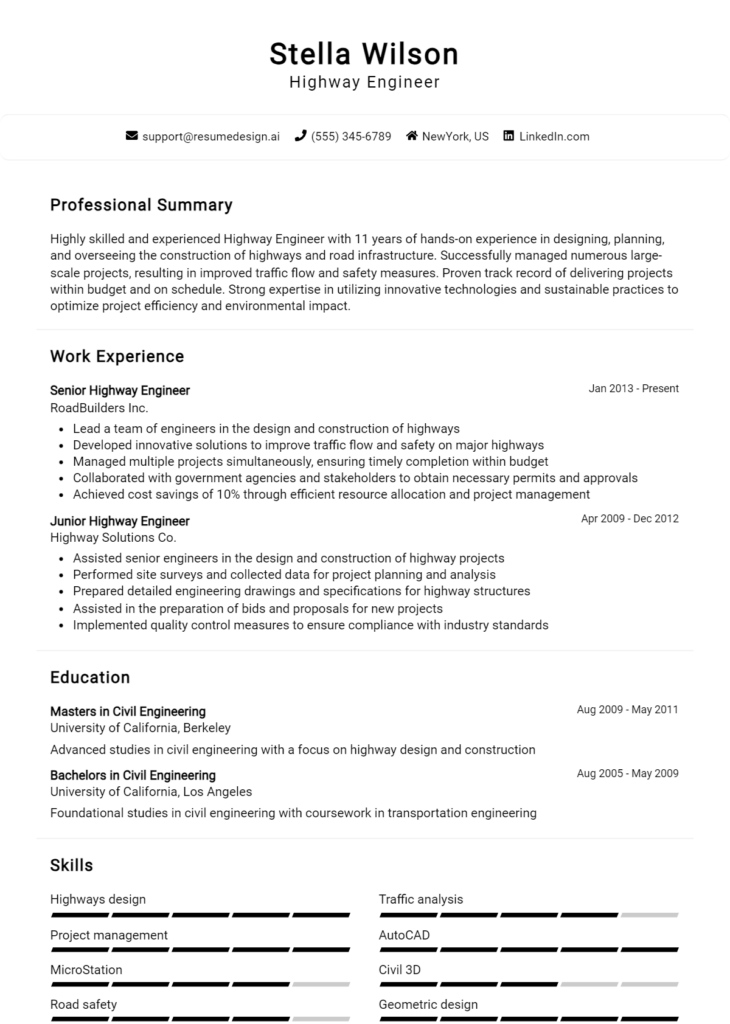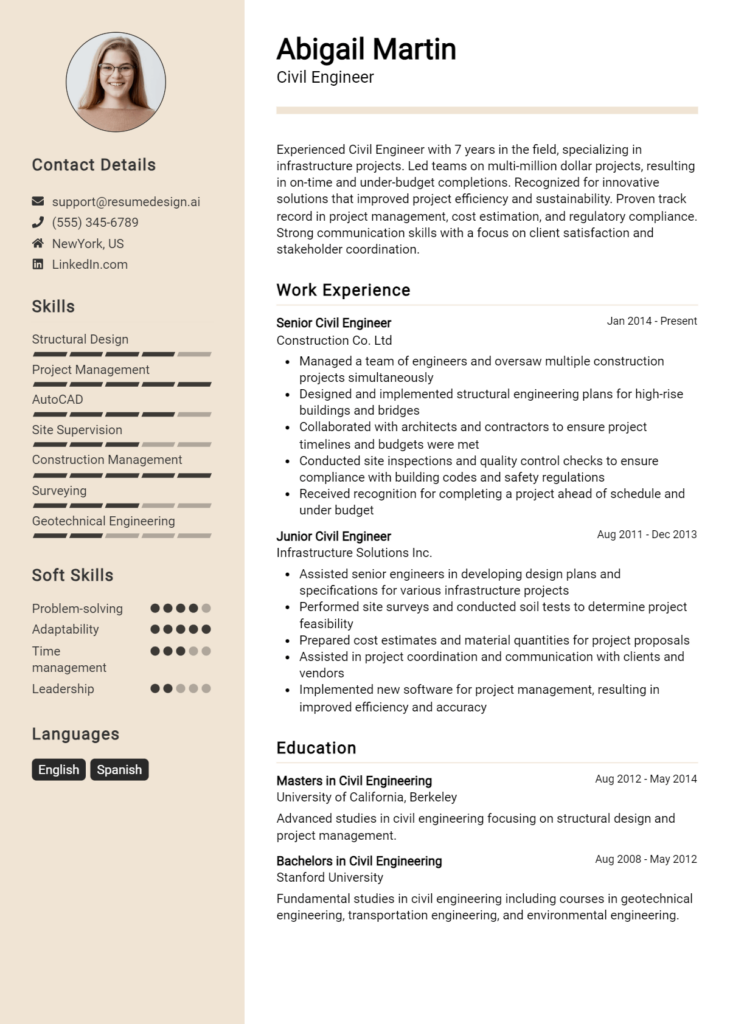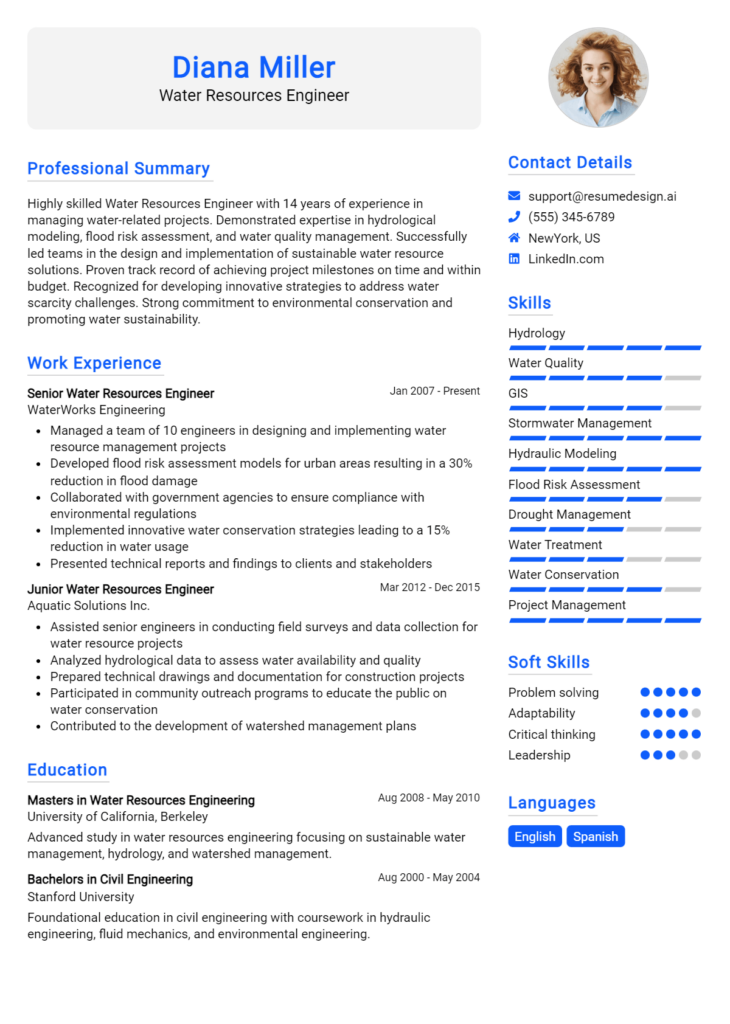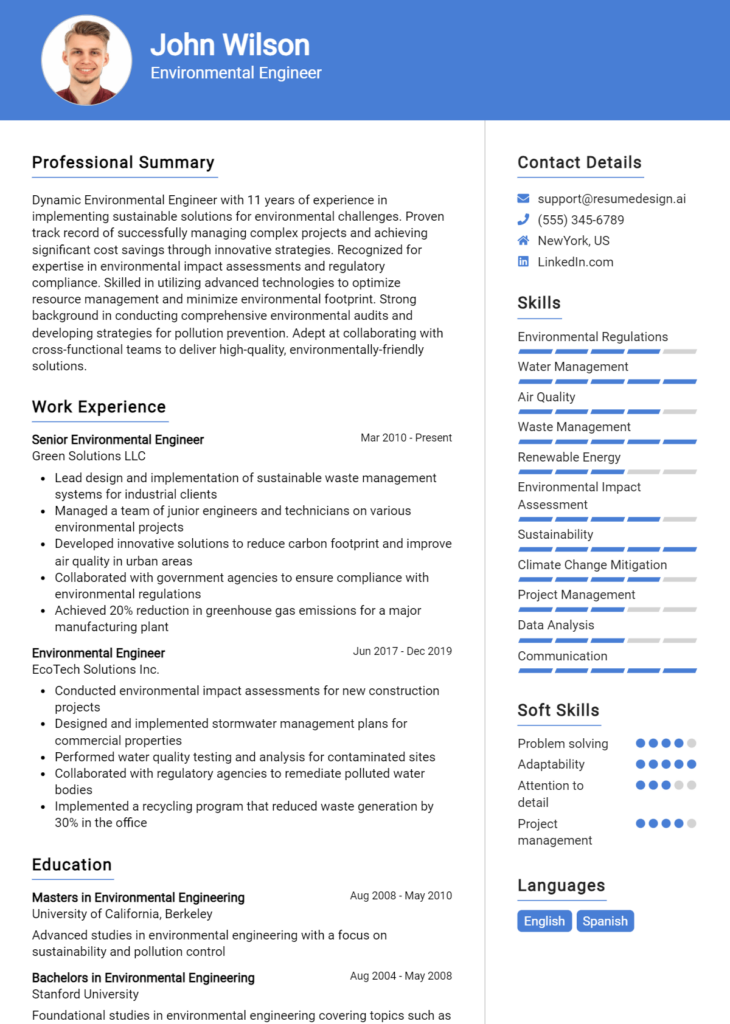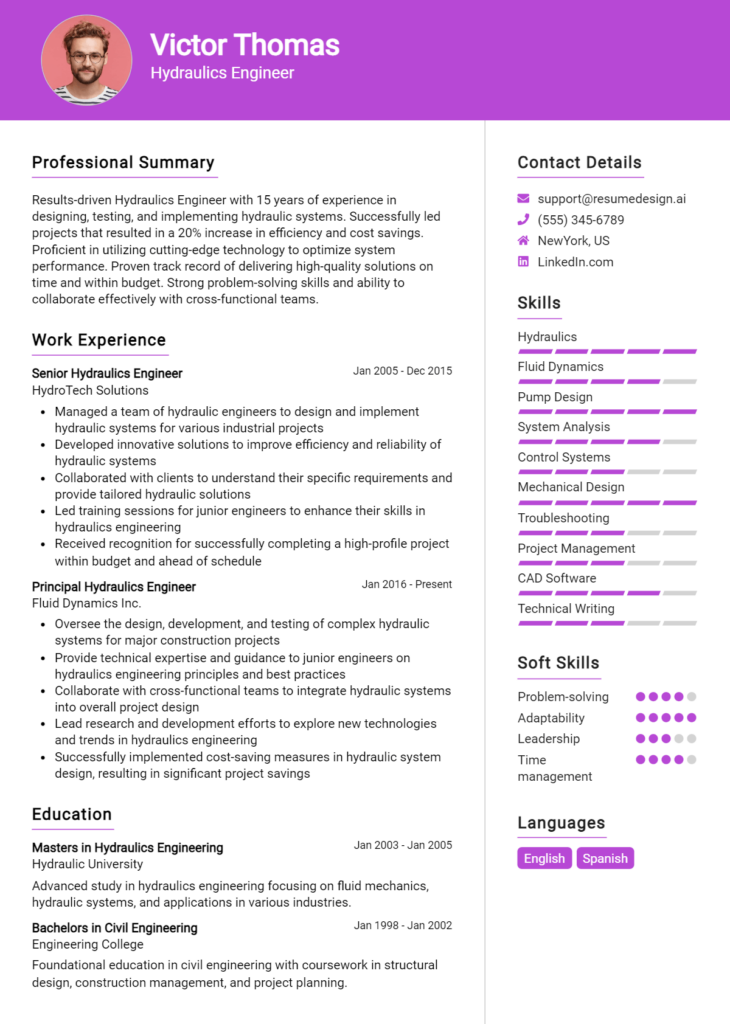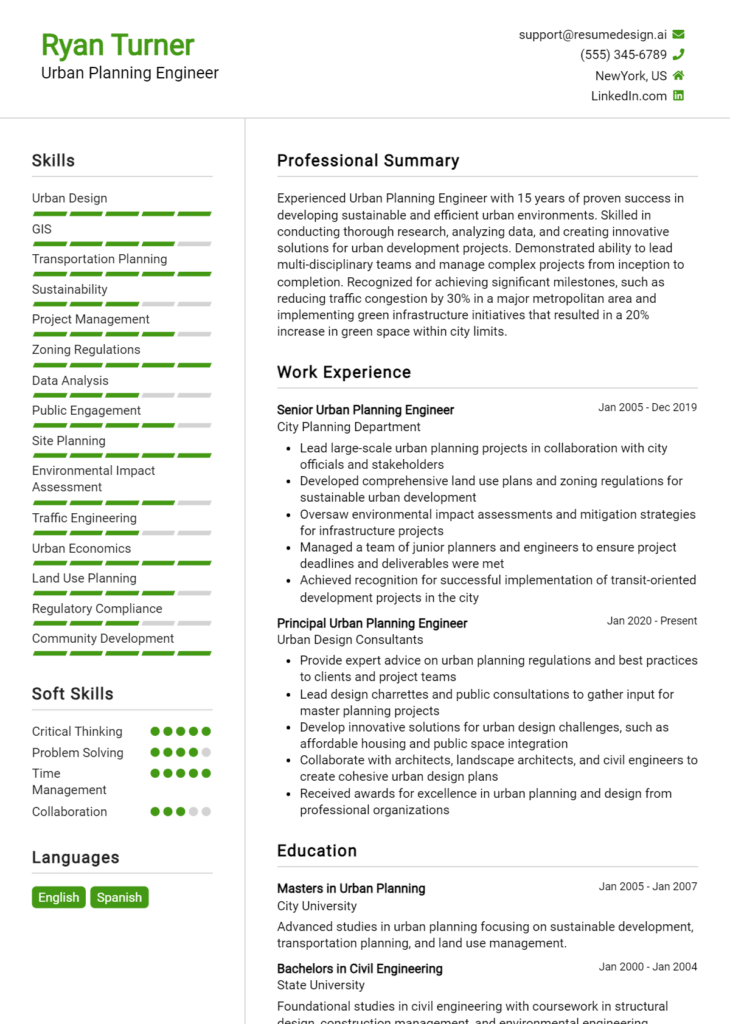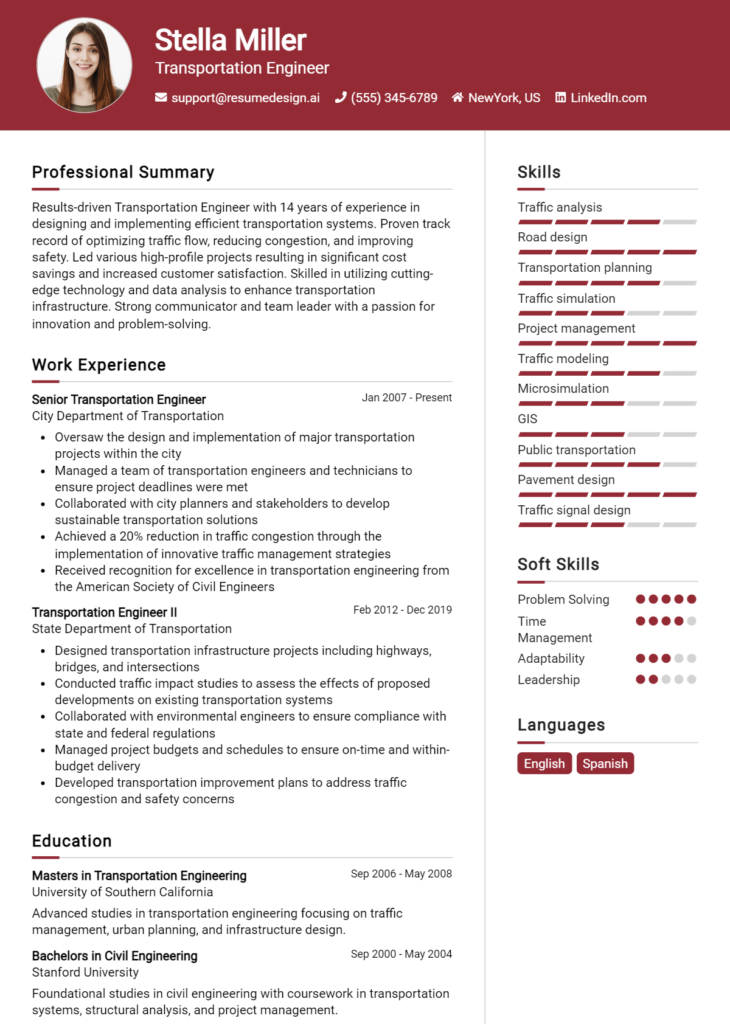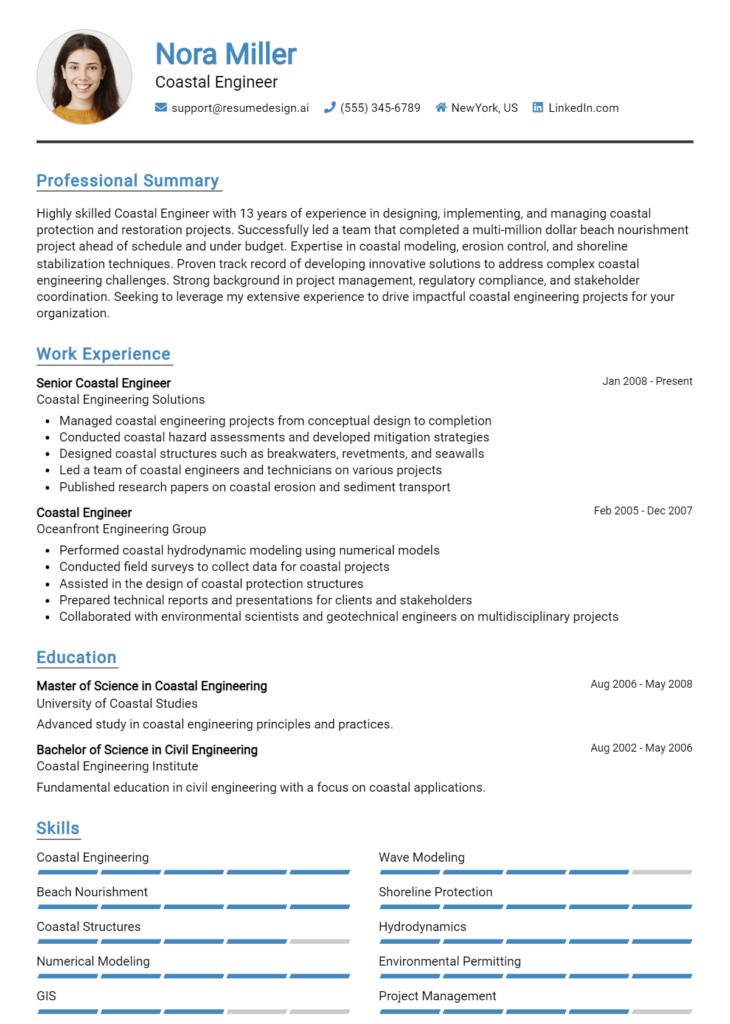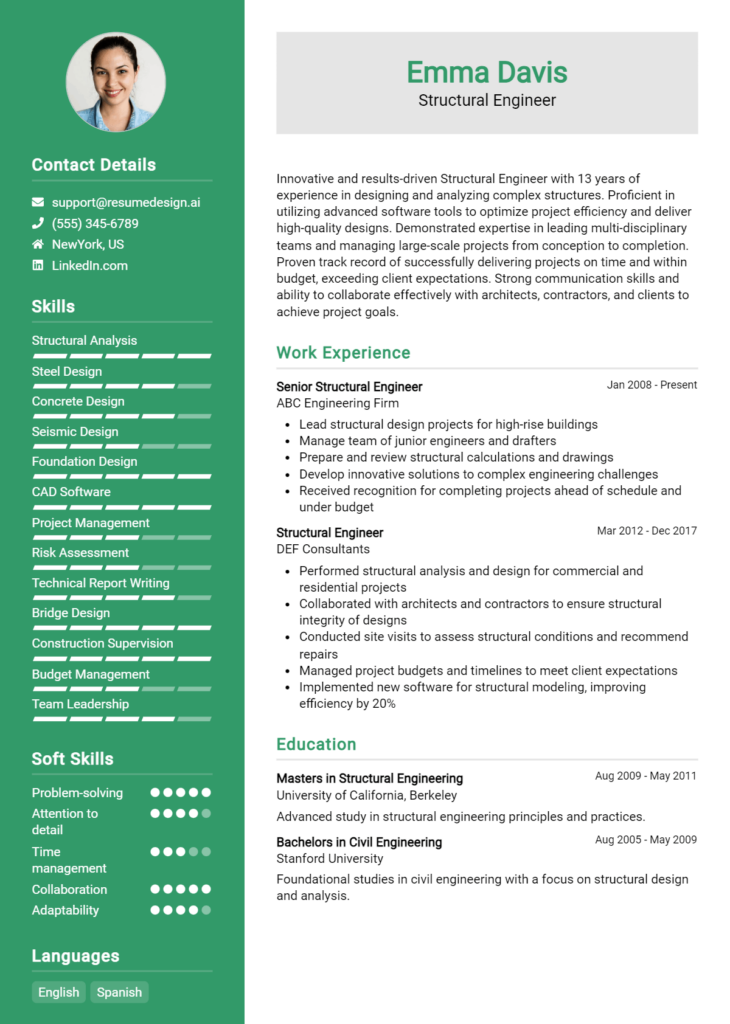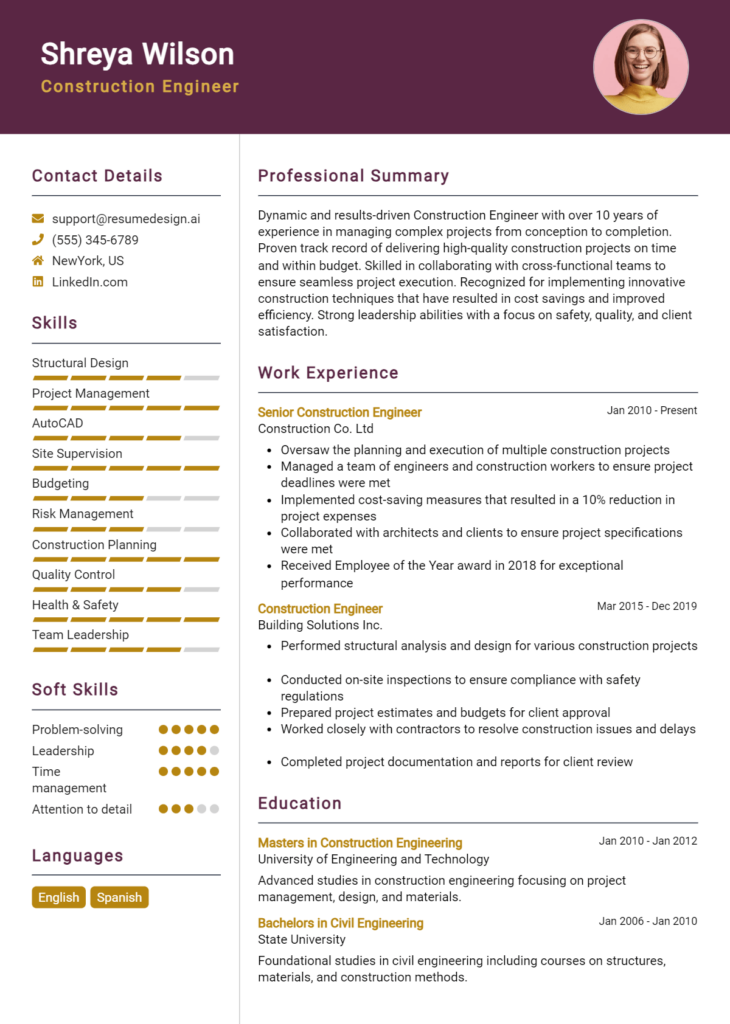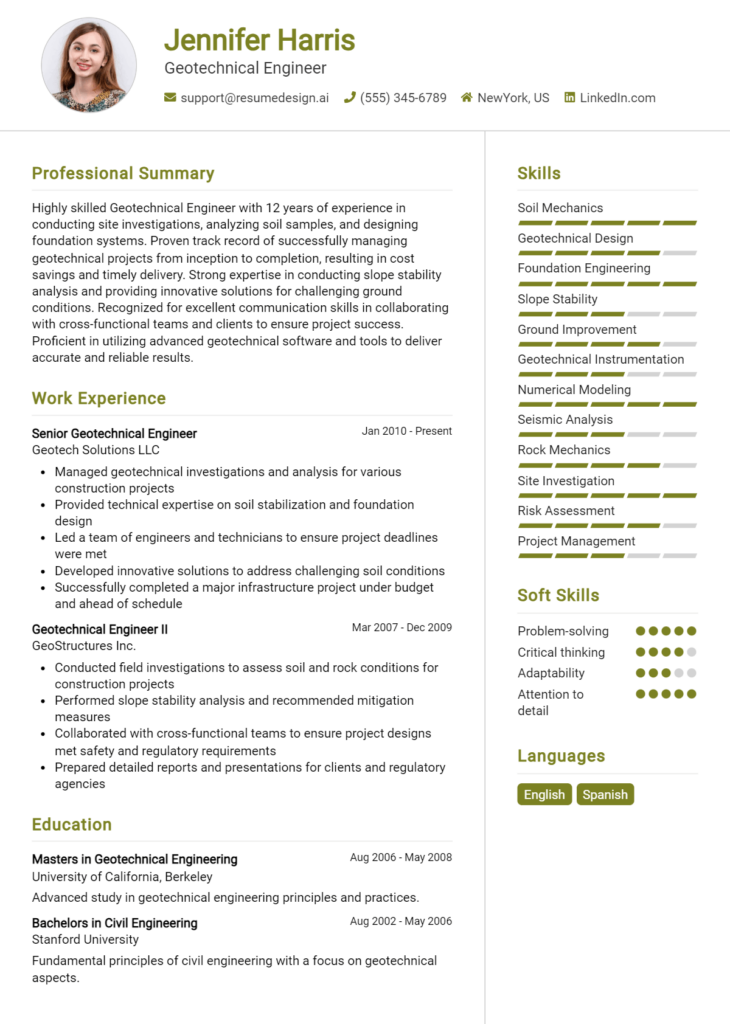Railroad Engineer Core Responsibilities
A Railroad Engineer plays a crucial role in ensuring the safe and efficient operation of trains, bridging various departments such as operations, maintenance, and safety. Key responsibilities include designing and implementing railway systems, conducting inspections, and troubleshooting equipment issues. Strong technical, operational, and problem-solving abilities are essential for success, as they contribute to the organization’s efficiency and safety goals. A well-structured resume is vital in showcasing these qualifications effectively to potential employers.
Common Responsibilities Listed on Railroad Engineer Resume
- Design and develop railway systems and infrastructure.
- Conduct regular inspections of track and equipment.
- Monitor and analyze train operations for efficiency.
- Implement safety protocols and ensure compliance with regulations.
- Collaborate with maintenance teams to address technical issues.
- Prepare detailed reports on engineering projects and inspections.
- Oversee the installation and maintenance of signaling systems.
- Coordinate with regulatory bodies for safety assessments.
- Utilize software tools for modeling and simulation of railway systems.
- Train and mentor junior engineers and technical staff.
- Evaluate project proposals and oversee budget management.
High-Level Resume Tips for Railroad Engineer Professionals
In the competitive field of railroad engineering, a well-crafted resume serves as your first opportunity to make a lasting impression on potential employers. Your resume is more than just a list of jobs; it is a reflection of your unique skills, achievements, and professional journey. Given the specialized nature of the railroad industry, it’s crucial to create a document that not only showcases your technical expertise but also aligns with the specific requirements of the position you are applying for. This guide will provide practical and actionable resume tips specifically tailored for Railroad Engineer professionals, helping you stand out in a crowded job market.
Top Resume Tips for Railroad Engineer Professionals
- Tailor your resume to each job description by using keywords and phrases from the posting.
- Highlight your relevant experience in railroad design, construction, and maintenance.
- Quantify your achievements with metrics, such as increased efficiency or reduced project costs.
- Include industry-specific skills like signal design, track geometry, and safety compliance.
- Showcase your familiarity with relevant software and technologies used in railroad engineering.
- List certifications and licenses pertinent to the railroad industry, such as P.E. or APTA certifications.
- Use a clean and professional format to enhance readability and visual appeal.
- Add a summary statement that encapsulates your expertise and career objectives.
- Incorporate projects or case studies that demonstrate your problem-solving skills and innovation.
By implementing these tips, you can significantly increase your chances of landing a job in the Railroad Engineer field. A targeted and well-organized resume not only highlights your qualifications but also demonstrates your commitment to the profession, making you a compelling candidate to prospective employers.
Why Resume Headlines & Titles are Important for Railroad Engineer
In the competitive field of railroad engineering, the importance of a compelling resume headline cannot be overstated. A well-crafted headline serves as the first impression a hiring manager has of a candidate, effectively summarizing their key qualifications and enticing the reader to explore further. A strong headline should be concise, relevant, and tailored to the specific job being applied for, allowing candidates to immediately grab attention and highlight their unique value proposition. By encapsulating critical skills and experiences in one impactful phrase, candidates can set themselves apart in a crowded job market.
Best Practices for Crafting Resume Headlines for Railroad Engineer
- Be concise: Limit your headline to a single phrase that captures your expertise.
- Use industry-specific terminology: Incorporate relevant jargon and keywords that resonate with railroad engineering.
- Highlight key skills or experiences: Focus on your most impressive qualifications that align with the job description.
- Be specific: Avoid vagueness by clearly stating your role or area of expertise.
- Showcase achievements: If possible, include a quantifiable accomplishment to demonstrate your impact.
- Tailor for each application: Customize your headline for every job application to reflect the specific requirements of the position.
- Avoid clichés: Steer clear of overused phrases that do not add value to your application.
- Maintain professionalism: Ensure your tone is suitable for the industry, reflecting your seriousness about the role.
Example Resume Headlines for Railroad Engineer
Strong Resume Headlines
"Experienced Railroad Engineer Specializing in Safety and Efficiency Improvements"
"Innovative Railroad Engineer with 10+ Years in Track Design and Maintenance"
"Results-Driven Railroad Engineer with Proven Record in Project Management"
Weak Resume Headlines
"Engineer Looking for Job"
"Skilled Worker in Transportation"
The strong headlines are effective because they clearly communicate the candidate's relevant experience and value, using specific language that speaks directly to the role of a railroad engineer. By highlighting unique skills and achievements, they create a compelling narrative that captures the attention of hiring managers. In contrast, the weak headlines fall short due to their vagueness and lack of specificity; they do not provide any meaningful insight into the candidate's qualifications and ultimately fail to engage the reader. This distinction emphasizes the importance of crafting thoughtful, targeted resume headlines that resonate with potential employers.
Writing an Exceptional Railroad Engineer Resume Summary
In the competitive field of railroad engineering, a well-crafted resume summary serves as a powerful tool for candidates to capture the attention of hiring managers quickly. This brief introduction showcases key skills, relevant experience, and notable accomplishments that align with the job role, allowing candidates to stand out in a crowded applicant pool. A strong summary should be concise, impactful, and tailored to the specific job the candidate is applying for, ensuring that it resonates with the employer's needs and expectations.
Best Practices for Writing a Railroad Engineer Resume Summary
- Quantify achievements: Use numbers and metrics to demonstrate the impact of your work.
- Focus on relevant skills: Highlight technical and soft skills that are crucial for a railroad engineer.
- Tailor the summary: Customize your summary for the specific job description to align with the employer's requirements.
- Keep it concise: Aim for 2-4 sentences that succinctly convey your qualifications.
- Use industry jargon: Incorporate terms and phrases common in the railroad engineering field to demonstrate expertise.
- Showcase problem-solving abilities: Mention specific challenges you've overcome in your previous roles.
- Highlight certifications: Include any relevant licenses or certifications to enhance credibility.
- Maintain a professional tone: Ensure the summary reflects a level of professionalism appropriate for the industry.
Example Railroad Engineer Resume Summaries
Strong Resume Summaries
Dedicated Railroad Engineer with over 10 years of experience in designing and implementing efficient rail systems. Successfully reduced project completion time by 30% through innovative engineering solutions, ensuring compliance with safety regulations and budget constraints.
Results-driven Railroad Engineer with a proven track record of managing large-scale infrastructure projects, leading teams of up to 20 engineers. Spearheaded the development of a new signaling system that improved operational efficiency by 25% while enhancing safety measures.
Accomplished Railroad Engineer specializing in track design and maintenance, with a focus on sustainability and cost reduction. Achieved a 15% decrease in maintenance costs through the implementation of advanced monitoring technologies, while ensuring minimal disruption to service.
Weak Resume Summaries
Experienced engineer looking for a position in the railroad industry. I have worked in various engineering roles and am familiar with the basics of rail systems.
Motivated professional with a background in engineering. Seeking to apply my skills in a railroad engineering role without specific achievements or focus areas.
The examples provided highlight the distinction between strong and weak resume summaries. Strong summaries effectively quantify achievements and demonstrate direct relevance to the railroad engineering role, showcasing specific skills and experiences. In contrast, weak summaries lack detail, fail to provide measurable outcomes, and appear too generic, making it difficult for hiring managers to see the candidate's value. A compelling summary should clearly articulate how a candidate's unique background and contributions align with the needs of the employer.
Work Experience Section for Railroad Engineer Resume
The work experience section of a Railroad Engineer resume is a critical component that illustrates the candidate's technical skills and their ability to manage teams effectively. This section not only highlights past roles and responsibilities but also emphasizes the candidate's contributions to high-quality project outcomes. By quantifying achievements and aligning experiences with industry standards, candidates can demonstrate their proficiency in the field and their readiness to tackle the challenges of railroad engineering. A well-crafted work experience section provides potential employers with a clear understanding of the candidate's capabilities, making it an essential element of the resume.
Best Practices for Railroad Engineer Work Experience
- Use action verbs to begin each bullet point, showcasing your contributions effectively.
- Quantify results where possible, such as percentage improvements, cost savings, or project timelines.
- Highlight technical skills relevant to railroad engineering, such as CAD software proficiency or knowledge of signaling systems.
- Include specific examples of successful teamwork or leadership experiences.
- Align your achievements with industry standards and best practices to demonstrate familiarity with the field.
- Focus on outcomes that had a significant impact on project success or safety improvements.
- Keep descriptions concise and focused, ensuring each point adds value to your application.
- Tailor your experiences to the specific job you are applying for, emphasizing the most relevant roles.
Example Work Experiences for Railroad Engineer
Strong Experiences
- Led a team of 10 engineers in the design and implementation of a new signaling system, resulting in a 30% reduction in train delays.
- Managed a $2 million track rehabilitation project, completing it 15% under budget and ahead of schedule, contributing to enhanced safety and reliability.
- Developed and executed a training program for new engineers, improving onboarding efficiency by 40% and increasing team productivity.
- Collaborated with cross-functional teams to integrate advanced technology in locomotive systems, leading to a 25% increase in fuel efficiency.
Weak Experiences
- Worked on various engineering tasks related to railroads.
- Assisted in projects without specific details on contributions or outcomes.
- Participated in meetings and discussions about railroad engineering topics.
- Helped maintain equipment and perform routine checks.
The strong experiences listed above are considered effective because they provide specific, quantifiable achievements that demonstrate the candidate's technical leadership and collaborative efforts in railroad engineering. Each point highlights significant outcomes that contribute to project success and showcases the candidate's ability to drive improvements. In contrast, the weak experiences lack detail and measurable results, making them less impactful and failing to convey the candidate's true capabilities in the field.
Education and Certifications Section for Railroad Engineer Resume
The education and certifications section of a Railroad Engineer resume plays a crucial role in establishing a candidate’s qualifications and expertise in the field. This section not only showcases the candidate's academic background but also emphasizes any industry-relevant certifications and ongoing learning efforts. By detailing relevant coursework, certifications, and specialized training, candidates can significantly enhance their credibility and demonstrate their alignment with the specific demands of the job role. This is essential in a field where technical knowledge and adherence to safety standards are paramount.
Best Practices for Railroad Engineer Education and Certifications
- Include relevant degrees such as a Bachelor’s or Master’s in Civil Engineering, Mechanical Engineering, or a related field.
- List industry-recognized certifications like the Professional Engineer (PE) license or certifications from the American Society of Civil Engineers (ASCE).
- Highlight specialized training programs or workshops that focus on railroad safety, signal systems, or track maintenance.
- Provide details on relevant coursework that directly pertains to railroad engineering, such as transportation engineering or structural analysis.
- Keep the information concise and relevant, avoiding unrelated degrees or certifications.
- Use clear and specific language to describe certifications and training, ensuring that they are up-to-date and recognized in the industry.
- Consider including ongoing education efforts, such as webinars or courses, to illustrate a commitment to continuous learning.
- Organize the section logically, prioritizing the most relevant qualifications and certifications to catch the employer's attention quickly.
Example Education and Certifications for Railroad Engineer
Strong Examples
- Bachelor of Science in Civil Engineering, University of XYZ, 2020
- Professional Engineer (PE) License, State of ABC, 2021
- Certificate in Railway Engineering, National Railway Institute, 2022
- Coursework in Transportation Systems and Rail Infrastructure Design, 2019
Weak Examples
- Associate Degree in General Studies, Community College of ABC, 2018
- Certification in Basic Plumbing, Trade School of XYZ, 2017
- High School Diploma, Local High School, 2016
- Outdated Certification in Construction Safety, 2015
The strong examples are considered effective because they directly align with the responsibilities and technical requirements of a Railroad Engineer, showcasing relevant degrees, recognized licenses, and specialized training that demonstrate expertise in the field. In contrast, the weak examples lack relevance to railroad engineering, featuring outdated certifications and unrelated educational qualifications that do not support the candidate's suitability for the role.
Top Skills & Keywords for Railroad Engineer Resume
In the competitive field of railroad engineering, showcasing the right skills on your resume is crucial for standing out to potential employers. A well-crafted resume not only highlights your technical expertise but also emphasizes your soft skills, which are equally important in ensuring effective communication, teamwork, and problem-solving on the job. By striking the right balance between hard and soft skills, you can demonstrate your suitability for the role and your ability to contribute positively to the railroad industry. For more insights on the importance of skills, check out this skills resource.
Top Hard & Soft Skills for Railroad Engineer
Soft Skills
- Problem-solving
- Communication
- Teamwork
- Attention to detail
- Time management
- Adaptability
- Leadership
- Critical thinking
- Interpersonal skills
- Conflict resolution
Hard Skills
- Knowledge of railroad operations and safety regulations
- Proficiency in CAD software
- Understanding of signal and track systems
- Experience with project management tools
- Data analysis and reporting
- Familiarity with locomotive mechanics
- Proficient in Microsoft Office Suite
- Knowledge of environmental regulations
- Ability to conduct inspections and assessments
- Experience with maintenance and repair procedures
By emphasizing these vital skills in your resume, you can effectively communicate your qualifications to potential employers and increase your chances of securing a position in this dynamic field. For further guidance on showcasing your professional background, explore this work experience resource.
Stand Out with a Winning Railroad Engineer Cover Letter
Dear Hiring Manager,
I am excited to submit my application for the Railroad Engineer position at [Company Name], as advertised on [Job Board/Company Website]. With a degree in Civil Engineering and over five years of experience in the railway industry, I am confident in my ability to contribute effectively to your team. My background in designing, analyzing, and maintaining railway infrastructure aligns perfectly with the requirements of this role, and I am eager to bring my expertise to [Company Name].
In my previous position at [Previous Company Name], I successfully led a team in the design and implementation of a new signaling system that improved safety and efficiency across a 200-mile stretch of track. My experience also includes conducting regular inspections and assessments of railway structures, ensuring compliance with federal regulations, and collaborating with multidisciplinary teams to resolve complex engineering challenges. I am particularly proud of my ability to leverage innovative technologies to enhance operational performance, which I believe aligns with [Company Name]'s commitment to progressive engineering solutions.
What excites me most about the opportunity at [Company Name] is your reputation for pioneering sustainable practices within the railroad industry. I am passionate about advancing environmentally friendly engineering solutions and have previously initiated projects that reduced the carbon footprint of railway operations. I am eager to contribute my skills in project management, problem-solving, and stakeholder engagement to help drive [Company Name]'s mission forward.
Thank you for considering my application. I look forward to the opportunity to discuss how my background, skills, and enthusiasms align with the objectives of [Company Name]. I am excited about the possibility of contributing to your team and helping shape the future of rail transportation.
Sincerely,
[Your Name]
[Your Phone Number]
[Your Email Address]
Common Mistakes to Avoid in a Railroad Engineer Resume
When crafting a resume for a Railroad Engineer position, it’s essential to present your skills and experience effectively to stand out in a competitive field. However, many candidates make common mistakes that can undermine their chances of landing an interview. By avoiding these pitfalls, you can create a compelling resume that showcases your qualifications and passion for the role.
Neglecting Relevant Experience: Failing to highlight specific experience related to railroad engineering can make your resume less impactful. Be sure to include relevant projects, internships, or positions that demonstrate your expertise in the field.
Using Generic Language: Overly broad or generic descriptions can weaken your resume. Tailor your language to reflect the specific skills and technologies relevant to railroad engineering to grab the attention of hiring managers.
Ignoring Keywords: Many companies use applicant tracking systems (ATS) to screen resumes. Not including industry-specific keywords can result in your resume being overlooked. Research the job description and integrate relevant terms into your resume.
Inconsistent Formatting: A cluttered or inconsistent format can make your resume difficult to read. Use a clean, professional layout with consistent fonts, headings, and bullet points to enhance readability.
Listing Duties Instead of Achievements: Simply listing job duties does not demonstrate your impact. Instead, focus on quantifiable achievements and outcomes to illustrate your contributions to previous roles.
Failing to Update Your Resume: An outdated resume can misrepresent your current skills and experiences. Regularly update your resume to include new projects, certifications, or advancements in technology relevant to railroad engineering.
Overemphasizing Soft Skills: While soft skills are important, they should complement your technical abilities rather than dominate your resume. Ensure that technical skills and certifications take precedence, as they are often the primary focus for employers in this field.
Not Tailoring for Each Application: Sending out the same resume for every position can be detrimental. Take the time to customize your resume for each job application, aligning your qualifications with the specific requirements and responsibilities outlined in the job description.
Conclusion
As we explored the vital role of a Railroad Engineer, we highlighted the key responsibilities that come with this position, including the design and maintenance of rail systems, ensuring safety standards, and collaborating with various stakeholders to optimize operations. The importance of continuing education and staying updated with technological advancements in railroad engineering was also emphasized, as these elements are crucial for career advancement in this ever-evolving field.
To stay competitive in the job market, having a well-crafted resume that reflects your skills and experiences is essential. We encourage you to take a moment to review your Railroad Engineer resume to ensure it effectively showcases your qualifications.
To assist you in this endeavor, consider utilizing our resources such as resume templates, which provide a structured format to highlight your strengths. Our resume builder can help you create a polished resume tailored to your specific experiences. Additionally, you can explore our resume examples for inspiration on how to present your accomplishments. Don't forget to enhance your application with a compelling cover letter using our cover letter templates.
Take action today and give your Railroad Engineer resume the attention it deserves!

